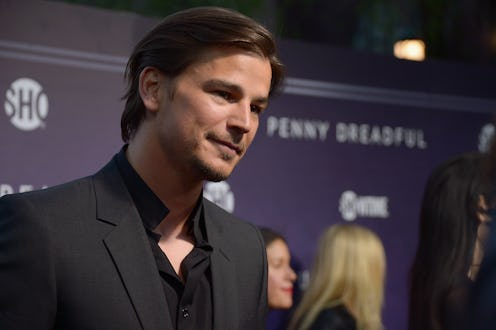Entertainment
Why Josh Hartnett Left Hollywood
It’s a difficult thing to do when you’re an actor, but Josh Hartnett has Penny Dreadful's Josh Hartnett always liked to go unnoticed. Of course, it’s even more difficult when you have your sparkly eyes and endearing tooth-gap plastered all over every teen and pre-teen’s trapper keeper who’s seen Pearl Harbor (that's basically every teen and pre-teen in 2001). The "unnoticed" plan didn't go so well. Even before he was a household name, there were the popular films: The Faculty and The Virgin Suicides, collectively starring most of “young Hollywood” in the late '90s. And after Hartnett’s breakout role as the girl-stealing Danny in audience magnet and critical punching bag, Pearl Harbor, he went on to more balanced acclaim in roles like the critically-respected O, and huge Blockbuster, Black Hawk Down. And after that, Hartnett sort of disappeared. Or rather, he began to go unnoticed.
Ironically enough, he’s returning to the big time after more than eight years off the radar, and he's playing an actor. In Penny Dreadful — premiering on Showtime Sunday, May 11, though the first episode is already available on YouTube — Harnett makes his return to the “national dialogue,” playing Ethan Chandler, a traveling Wild West reenactor who takes a role as a hired gunman. Now, while doing publicity for Penny Dreadful, Hartnett is having to explain over and over “where he's been,” when really, he never went anywhere. He’s been around, making films he could be proud of — they just weren’t films anyone would ever see. That, he says, was his mistake.
After achieving huge success in his early 20s, Hartnett got tired — tired of being recognized, tired of Hollywood, tired of roles that were bigger than he was. So at a turning point in his career, a point where he was in discussions to play Spider-Man, and Batman, and Superman, he trucked it back to his hometown in Minnesota. But he wants you to know that he's okay with his decision. He told TIME it was a bit like he was in a relationship with Hollywood where they weren't at the same place at the same time: “I wanted something that they didn’t want to give me. So I took a break from my relationship.”
Hartnett's break gave him a little perspective — enough perspective to realize that the world didn't revolve around what he was doing, and to create interesting stories, he needed to become his own interesting story first. He began taking on independent film roles, of which he notes Lucky Number Slevin (2006), Bunraku (2010), and Parts Per Billion (2014) as a few he's most proud of. The problem with "taking a different path towards achieving good film" is that Hollywood has pretty strict a pretty strict set of guidelines for the kind of good film they deem marketable, the kind they'll put money behind. In his break from big budgets, Hartnett realized that to continue to make the kind of film he wanted to make, and see it distributed in a way that will give it even the opportunity of having an audience, he needed to be someone that Hollywood would want to distribute; someone more visible; someone a little more like 2001 Josh Hartnett, maybe.
And so, here he is in Penny Dreadful, making a grab for TV audiences, who come back "week after week after week." Older and wiser now, Hartnett knows he needs to "play the game" to make interesting projects like this one. After Penny Dreadful, he hopes for a few more roles "in the system," that will give him more clout to take a few more roles outside of it too. So, we know where he is now: He's on Showtime at 10 PM for the next eight weeks. The questions remains: Where will Josh Hartnett go from here?
As his character says in the first episode of Penny Dreadful, "That sounds like a warning." No, no: "It's an invitation."
